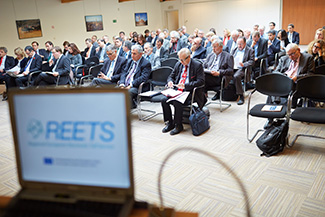ASECAP held REETS Day in Bruxelles - Moving towards an interoperable Electronic Toll Service in Europe
Presentation of results of the Regional European Electronic Toll Service Project
In compliance with and in support of the existing EC legislation regarding the interoperability of electronic road toll system (Directive 2004/52/EC and the subsequent Decision 2009/750/EC) the proposed Project (REETS TEN) aims at deploying EETS compliant services in a cross-border regional project. The Project shall cover the electronically toll network of 7 Member States (Austria, Denmark, France, Germany, Italy, Poland and Spain) and Switzerland.
On the 5th November 2014 the REETS Day was held in Bruxelless. The REETS Project has delivered some great results shedding more light on the commercial and technical issues related to the implementation of the European Electronic Toll System (EETS). The key work carried out has set up the basis for the future deployment of the EETS by creating a unique platform where toll chargers and toll providers exchanged their ideas, expertise and knowledge on how to deliver an interoperable electronic toll service in Europe.

Analytical phase of the project – identification of key obstacles to deployment of EETS
The REETS consortium introduced the main results achieved during the initial analytical phase of the project. The analysis and findings of the work packages 1- 4, focused on issues such as the contractual agreements between toll charger and toll operators, certification, key performance indicators and security were highlighted and shared with the audience. An interactive discussion with the key stakeholders and experts participating to the conference was crucial in order to fulfill “the return of experience” component of the project and ensured that these results are beneficial to the work carried out in other projects and activities in the EETS domain

The REETS Day has been a very fruitful event which has provided the opportunity to share with the key EETS stakeholders all the elements analysed during the analytical phase of the project. Furthermore the REETS partners have also highlighted the main activities and planned outcomes of the “monitoring phase” of the project which will seeks to foster interoperability on a cross border regional scale. The political discussion has also been extremely interesting as it was a concrete and straightforward exchange of views and opinions between the European Commission and the external stakeholders on the main obstacles affecting the implementation if the EETS and the possible way forward.
The REETS Project will present its final results/analysis at the end of 2015 hoping to gather some very concrete recommendations for the future implementation of the EETS on a European scale.
More information on REETS project are available on the web page www.reets.eu
